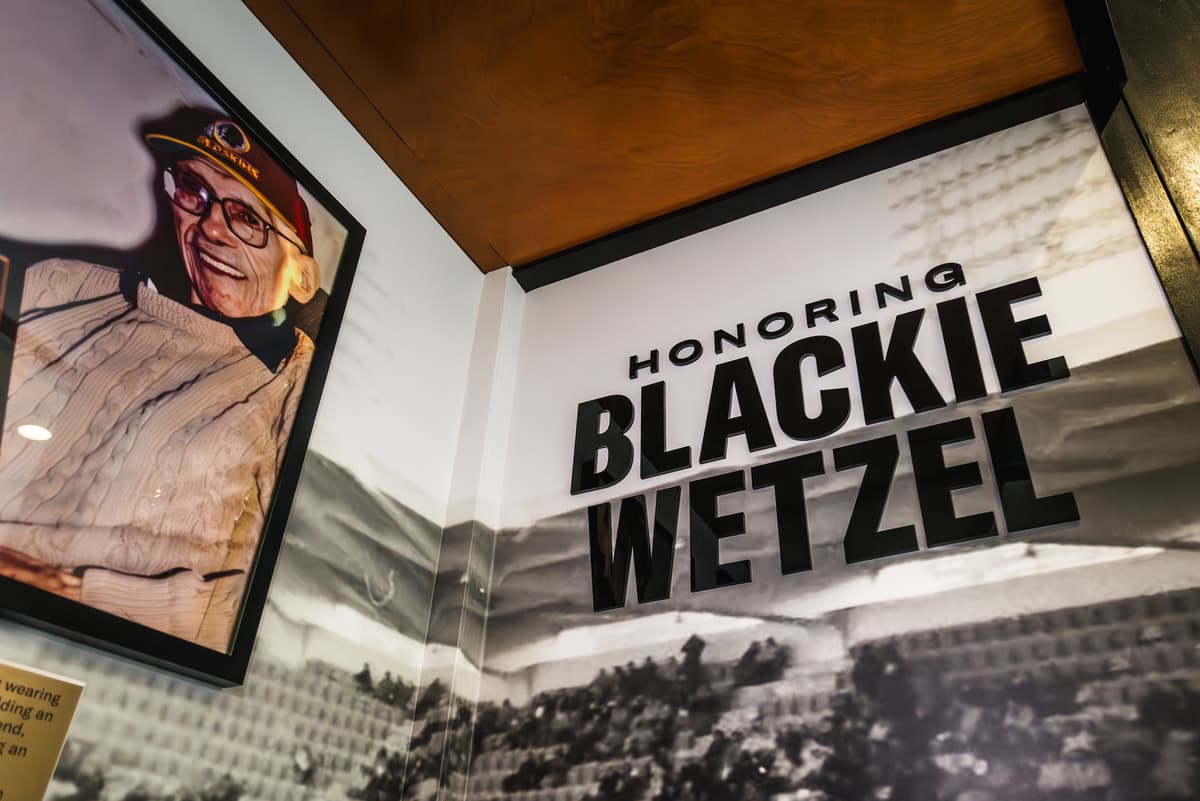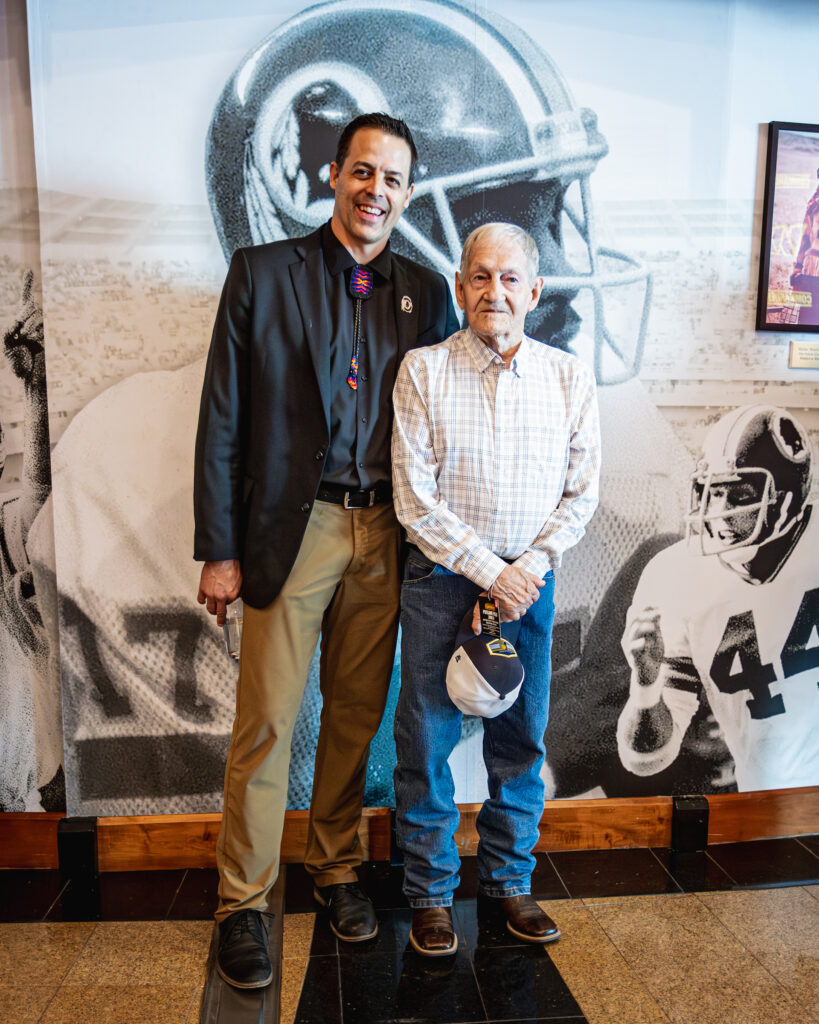Although Washington Commanders Dropped Its Original Logo, Team Will Honor the Man Behind It
The design of the Blackfeet Warrior was meant to be a source of Native American pride.

For nearly half a century, team helmets for the Washington Commanders were adorned with a logo designed by the tribal chief of the Blackfeet Nation, Walter “Blackie” Wetzel. In the wake of George Floyd’s murder and the subsequent national reckoning with racial injustice, the franchise was pressured in 2020 to abandon its controversial name and imagery.
Under new ownership headed by Josh Harris, the Commanders are bringing back the logo — sort of. A plaque featuring the logo and a brief biography of Wetzel has been installed in the Club section of Northwest Stadium at Landover, Maryland. It’s a gesture to recognize his significant role in shaping the team’s visual identity.
“It’s righting a wrong,” the grandson of Wetzel, Ryan Wetzel, told The New York Sun. “My grandfather’s whole vision was to make sure that he utilized that platform to help raise awareness around our American Indian, Native American communities in the United States. A lot of people didn’t know the true story behind it.”
The Commanders told the Sun there are no plans to use the logo again for commercial purposes, but after hearing who Blackie Wetzel was, the organization felt him worthy of being honored. Twenty-two members of the Wetzel family attended a ceremony of recognition hosted by the Commanders before a game against the New York Giants on September 15.
“We wanted to honor the man who created a logo, and more importantly did great things for the Native American community,” the vice president of public affairs for the Commanders, Kirtan Mehta, told the Sun. “Let’s put aside the old name and focus on the man who contributed to this team’s legacy.”

The inscription on the plaque reads as follows: “A member of the Blackfeet Nation, Wetzel was a fervent advocate for Indigenous communities, serving in role as Chairman of the Blackfeet Tribe and President of the National Congress of American Indians during his life. After a 1971 meeting with the team about the decades-old “R” logo, Wetzel designed this logo to symbolize and pay tribute to indigenous populations and to honor the many values embodied by this country’s first peoples, including strength, pride, courage, and service.”
Born on the Blackfeet Reservation in Montana in 1915, Water “Blackie” Wetzel lettered in boxing, track, and football at the University of Montana. He fathered nine children after marrying Doris Barlow in 1938. In 1956, Wetzel was named tribal council chairman and became the first Blackfeet president of the National Congress of American Indians in 1960.
He also worked for the U.S. Department of Labor and advocated on behalf of Indigenous communities to promote jobs and housing programs and alleviate overcrowding and unemployment.
Wetzel, who died in 2003, mingled with some of the most powerful political figures of his era. Ryan Wetzel sent photos to the Commanders of his grandfather alongside John F. Kennedy, Lyndon Johnson, and Robert F. Kennedy.
“They were surprised who Walter Blackie Wetzel was,” Ryan Wetzel said of the Commanders’ new ownership. “It was fun to put pieces together for them and then for them to realize, ‘Wow, this guy created the logo and it’s a wonderful thing.”
The Commanders have made it clear the logo isn’t coming back for commercial purposes. “It’s still too difficult an issue,” Mr. Mehta said. “We won’t allow it. The NFL won’t allow it. The vendors won’t allow it. So it’s not an option. But we want to do whatever we can to honor Blackie Wetzel and what he meant to the team.”
Ryan Wetzel, the legal representative for the estate of Wetzel and the director of an urban healthcare clinic in western Montana, is hopeful that might change in time. Ryan’s father, Don Wetzel, the first Montana Native American to graduate from an NCAA Division 1 school while playing four years of basketball, attempted to reclaim the logo to raise awareness of missing and murdered indigenous women. He died in March 2023.
“I’m hopeful that somewhere along the line we can see that as part of the franchise again in some capacity,” Ryan Wetzel said. “Maybe not tomorrow. Maybe not next season, but somewhere. You can’t cancel this thing. If you look at the history of the American Indian they’ve been canceled since the beginning of the formation of our great nation. We’ve got to quit doing that. This whole cancel culture ideology is frustrating. You’ve got to do your homework. This logo is a celebration.”
The logo isn’t free of controversy. Decedents of John “Two Guns” White Calf, a Blackfeet chief who died in 1934, assert the depicted feathered Native American warrior is an image of their ancestor. The Wetzels contend that there are documents and recordings confirming the design was inspired by a collection of photographs and drawings. The Commanders said they intend to keep discussions about the logo within the Wetzel family. Attempts by the Sun to contact the White Calf family were unsuccessful.
Ryan Wetzel praised Washington’s new ownership group for taking the time to learn the truth behind the logo. “Just having that relationship with public affairs and everybody that’s part of the Commanders, it’s night and day from what we experienced from the Dan Snyder ownership,” Mr. Wetzel said. “I just want to tell the story of my grandpa.”

